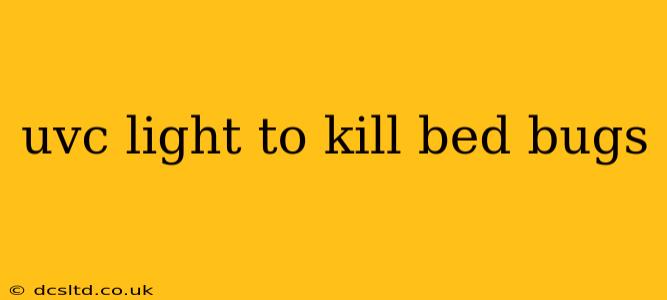Bed bugs are tiny, nocturnal insects that feed on human blood, causing itchy welts and sleepless nights. While various methods exist to combat these pests, UVC light has emerged as a potential solution. This comprehensive guide explores the effectiveness, safety, and practical applications of using UVC light to eliminate bed bugs.
Does UVC Light Kill Bed Bugs?
Yes, UVC light can kill bed bugs. UVC (ultraviolet-C) light is a short-wavelength ultraviolet light that's known for its germicidal properties. Its high energy disrupts the DNA of microorganisms, including insects like bed bugs, rendering them unable to reproduce or survive. However, it's crucial to understand that direct exposure is necessary for effective killing. Simply shining UVC light in a room won't automatically eradicate an infestation.
How Effective is UVC Light Against Bed Bugs?
The effectiveness of UVC light against bed bugs depends on several factors:
- Intensity of the UVC light: Higher intensity lamps are more effective at killing bed bugs.
- Exposure time: Bed bugs need sufficient exposure to the UVC light to be killed. Shorter exposure times may only stun or partially damage them.
- Direct contact: The UVC light must directly hit the bed bugs for it to be effective. Hidden bed bugs are unlikely to be eliminated.
- Type of UVC lamp: Different lamps have different wavelengths and intensities. Ensure you use a lamp specifically designed for germicidal purposes.
While UVC light can be a valuable tool in bed bug control, it's rarely a standalone solution. It's most effective when used as part of a comprehensive pest control strategy.
What are the Safety Precautions When Using UVC Light?
UVC light is harmful to human skin and eyes. Direct exposure can cause burns, eye damage, and even skin cancer. Therefore, it's crucial to take the following precautions:
- Never look directly at the UVC light.
- Wear appropriate protective gear, including UVC-blocking goggles and gloves.
- Ensure proper ventilation in the area where you are using the UVC light.
- Keep children and pets away from the area during and after treatment.
- Follow the manufacturer's instructions carefully.
Can UVC Light Kill Bed Bug Eggs?
UVC light is less effective against bed bug eggs than against adult bed bugs. The eggshells provide some protection from the UVC radiation. Therefore, while UVC light might kill some eggs, it's not a reliable method for eliminating them entirely.
Is UVC Light a Replacement for Professional Bed Bug Treatment?
No, UVC light is not a replacement for professional bed bug treatment. While it can be a helpful tool in reducing bed bug populations, it's rarely sufficient to completely eliminate an infestation. A professional pest control service will use a combination of methods, including insecticides, heat treatments, and possibly UVC light, for a comprehensive approach.
How to Use UVC Light for Bed Bug Control?
Using UVC light for bed bug control requires a systematic approach. Identify infested areas, ensure proper safety precautions, and direct the UVC light to those areas for the recommended exposure time. Repeat the treatment as needed. However, it's strongly recommended to consult with a pest control professional for guidance and to ensure the safest and most effective application.
What are the Advantages and Disadvantages of Using UVC Light to Kill Bed Bugs?
Advantages:
- Can kill bed bugs effectively with direct exposure.
- Environmentally friendly (compared to some chemical insecticides).
- Relatively inexpensive compared to other treatment methods.
Disadvantages:
- Requires careful handling due to safety concerns.
- May not kill all bed bugs or eggs.
- Ineffective against hidden bed bugs.
- Requires consistent and direct application.
This information is for educational purposes only and should not be considered a substitute for professional pest control advice. Always consult with a pest control expert for a tailored treatment plan for your specific situation.
